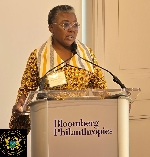Grace Ayensu Danquah’s lawyers accuse GTEC of bias and overreach in title dispute
 Dr Grace Ayensu-Danquah
Dr Grace Ayensu-Danquah
A legal showdown is brewing between Dr. Grace Ayensu Danquah and the Ghana Tertiary Education Commission (GTEC), as her lawyers accuse the regulator of bias, impropriety, and exceeding its mandate in questioning her academic and professional credentials.
In a letter dated August 13 and addressed to GTEC’s Director-General, Professor Ahmed Jinapor Abdulai, Dr. Ayensu Danquah’s legal team, led by lawyer David K. Ametefe, described the Commission’s handling of the matter as “abrasive, unnecessarily combative, and disparaging.”
The dispute stems from GTEC’s assessment of Dr. Ayensu Danquah’s right to use the title Professor.
Her lawyers argue that the Commission’s conclusions were unfounded, procedurally irregular, and damaging to her reputation.
“The assessment appears to have been carried out without transparency, and without clear indication of the statutory or regulatory framework relied upon,” the letter stated, warning that the process risked being influenced by “subjective or extraneous considerations.”
The legal team also criticised GTEC’s decision to circulate its correspondence to Parliament, the Presidency, and other high-ranking offices, calling it “wholly improper and potentially defamatory.”
They argued that dragging her political service as an MP and Deputy Minister into an academic matter was unjustified.
According to the lawyers, GTEC has no authority to redefine or diminish titles conferred by foreign universities.
They rejected the Commission’s alleged stance that only tenure-track appointments justify the title “Professor,” describing it as “erroneous, inconsistent with international academic practice, and an overreach of its mandate.”
Citing frameworks such as the UNESCO Global Convention on the Recognition of Qualifications and the Lisbon Recognition Convention, they insisted that academic titles should be respected as awarded unless substantial differences can be proven.
The lawyers further demanded that GTEC disclose the process behind its conclusions, clarify its statutory authority, and show evidence that their client was given an opportunity to respond before the correspondence was issued.
They also pressed for clarity on available mechanisms of appeal.
Failure to respond within 14 days, the letter warned, would compel Dr. Ayensu Danquah to seek legal remedies, including judicial review and declaratory relief to protect her reputation.
The letter was copied to the Chief of Staff, the Minister of Health, the Clerk of Parliament, and the Chairman of GTEC’s Board—offices her lawyers say were already improperly involved by the Commission in what should have been a discreet academic matter
Source: classfmonline.com/Cecil Mensah
Trending News

Foreign Minister arrives in Côte d’Ivoire on a working visit to address welfare of Ghanaian refugees
15:50
Ghana partners Oceana to boost ocean conservation with new country office
12:10
Ghana solidarises with Qatar, sees Israel's 'unprovoked' fatal attack as counterproductive
14:00
Sunyani Assembly decongest city today
11:36
Court remands NPP’s Abronye DC in Police custody for two weeks
14:54
Kyei Mensah-Bonsu insists Ibrahim Mahama persuaded President Mahama to concede defeat in 2016
11:35
Ministry of Health appoints Tony Goodman as acting Head of Health Training Institutions Unit
13:50
Africa Climate Summit 2025: Samira Bawumia joins high-level session with African leaders in Ethiopia
13:05
Lands Minister inaugurates Timber Validation Committee to strengthen forest governance
14:13
Adutwum hailed as Ghana’s most impactful Education Minister amid criticisms
10:25



